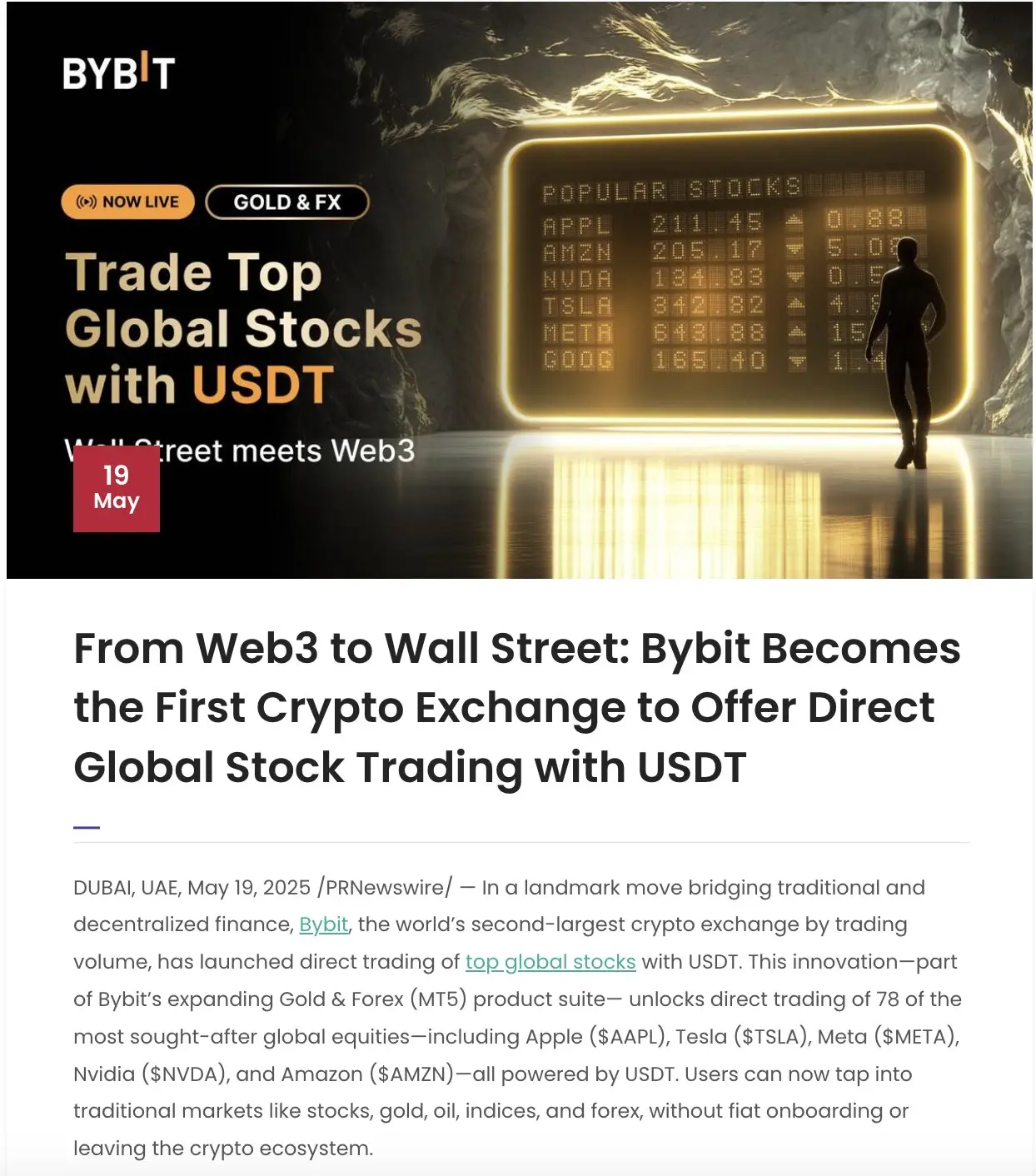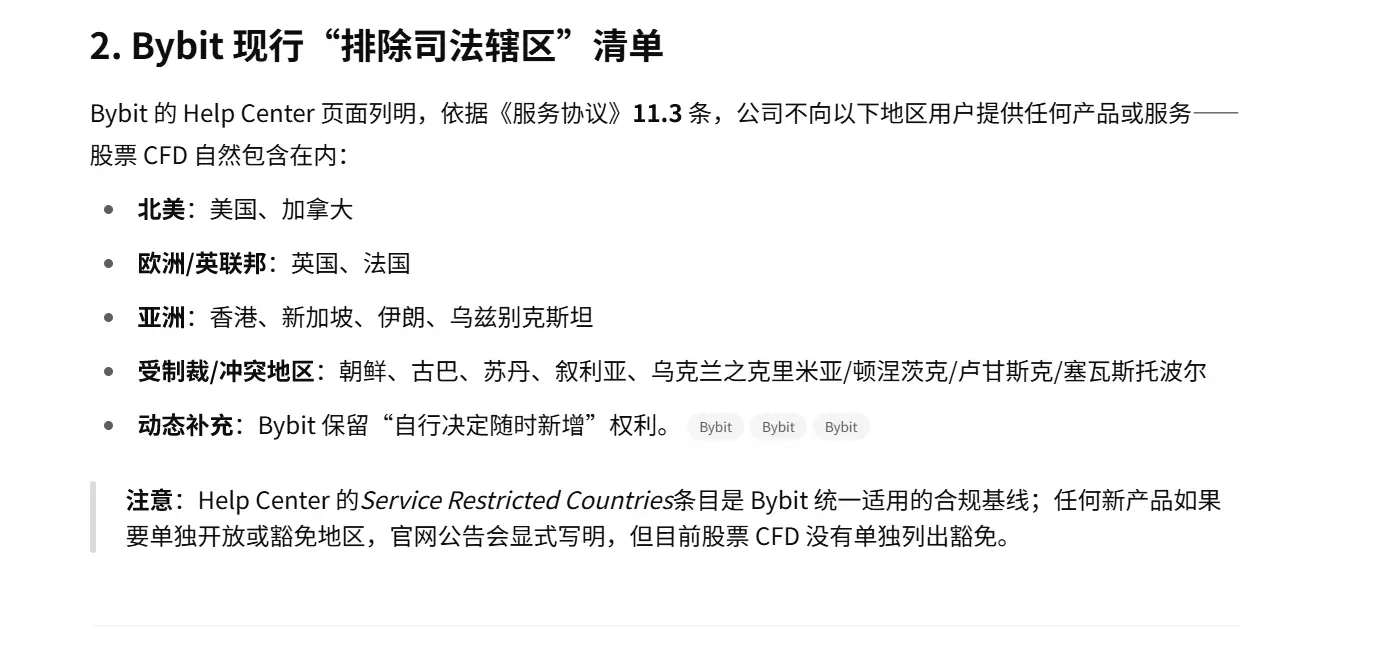Author: Scof, ChainCatcher
Editor: TB, ChainCatcher
On May 19, Bybit announced that it became the first major cryptocurrency exchange to support direct trading of global stocks using USDT.
However, KOL Crypto Fearless pointed out that Bybit is not the only cryptocurrency exchange in the world offering stock trading as it claims, which sparked heated discussions in the community.
Controversy 1: Not the First Cryptocurrency Exchange to Support US Stock Trading
Although Bybit claims in its official promotion to be the "only cryptocurrency exchange in the world supporting stock trading," this is not the case.
As early as 2020, the now-defunct FTX launched stock tokens and forex trading services, allowing users to indirectly invest in US stocks with crypto assets and achieve mapping through on-chain tokens. Even earlier, platforms like eToro and Bitpanda had opened product channels between cryptocurrency and traditional securities markets. Although the product mechanisms differ slightly, Bybit cannot be considered a pioneer in the positioning of "cryptocurrency platforms providing stock trading."

Controversy 2: Not Buying Actual Stocks, but Trading via CFD
The stock trading feature launched by Bybit primarily provides users with stock Contract for Difference (CFD) trading services through its MT5 platform. The specific working principle is: users create an MT5 sub-account within the Bybit platform, fund that account with USDT, and then "trade" stocks in the system in the form of CFDs. In reality, users do not gain ownership of these stocks and do not have any shareholder rights. To some extent, it resembles users betting on price fluctuations, with the platform or its partnered market makers assuming the role of liquidity providers. (According to Bybit's official announcement, there is currently no clear indication of which market maker provides trading depth.)
As for CFDs, they are essentially a derivative trading tool, formally known as Contract for Difference, which allows users to trade based on asset price changes without holding the asset itself. This mechanism is relatively common in traditional finance; however, the premise for using this mechanism is that the platform must hold relevant derivative trading licenses.
According to public information, Bybit has obtained licenses including Dubai VARA, Cyprus CySEC, and Georgia VASP licenses. Additionally, it has received pre-approval from Kazakhstan AFSA and UAE SCA and is advancing MiCA-related applications in France. However, the licenses obtained primarily cover the fields of crypto assets and CFDs, and do not constitute legal access to the US securities market.
In this regard, Guo Yatao, a partner lawyer and director of the Digital Economy Committee at Beijing Strategy Law Firm, told ChainCatcher that the current regulatory system in the US is designed for traditional securities trading products and models, making it difficult to fully cover new financial products and trading mechanisms, including stablecoin settlements and CFD structures. Under the premise that legal applicability standards have not been updated, such businesses are unlikely to meet regulatory requirements and will inevitably face non-compliance issues.
Currently, Bybit's official announcement does not show information about the third-party asset management institutions responsible for Bybit's stock trading business, nor does it provide specific clearing path explanations.
As a platform, publicly clarifying the product mechanism is an important measure to reassure users. Therefore, ChainCatcher will continue to monitor Bybit's subsequent official announcements and other information to provide relevant updates for investors interested in this product.
Compliance Remains a Huge Challenge for Crypto Companies Involved in US Stock-Related Businesses
Of course, Bybit is not an isolated case; crypto-native companies venturing into traditional stock and bond markets face compliance challenges.
Currently, the mainstream product mechanisms for cryptocurrency exchanges entering the traditional securities market typically do not involve actual stock holdings but achieve price mapping through the aforementioned CFDs, price-tracking derivatives, or stock tokens.
In practice, different platforms have constructed various product paths and compliance strategies based on their regulatory positioning and business models.
For example, Robinhood primarily operates under the US domestic regulatory system, with its stock and ETF business regulated by the SEC and FINRA. Its crypto business has also obtained a virtual currency license in New York, and its "zero commission + compliant clearing" model is popular among young users.
eToro supports users in investing in US stocks, ETFs, forex, and other assets in fiat or cryptocurrency forms, and holds regulatory licenses in multiple jurisdictions. Its stock trading adopts a model that coexists with real stocks and CFDs. Bitpanda provides users with fractional trading based on derivative agreements through its so-called "Bitpanda Stocks" service, relying on a market maker mechanism for liquidity support, and clearly indicates that users do not actually hold stocks but are participating in price-tracking financial contracts.
The following image compares the mechanisms of cryptocurrency platforms supporting US stock trading:

In fact, compared to traditional securities firms, cryptocurrency exchanges face compliance hurdles that go beyond just obtaining a license if they want to legally provide stock trading services. This involves regulatory differences across various jurisdictions.
For instance, in the US, any platform involved in securities trading must obtain a securities dealer or alternative trading system (ATS) license and be subject to ongoing regulation by the SEC and FINRA. Trading data must be included in compliance clearing institutions like the DTCC system. Platforms must disclose the destination of user funds and explain the trading execution path and asset custody methods. Otherwise, even if the platform itself is not in the US, as long as it opens business to US users, it may be deemed to be illegally providing securities services.
Moreover, even in some regions with relatively lenient compliance, such as Dubai, Singapore, and Mauritius, cryptocurrency exchanges must apply for specific financial service licenses to provide stock CFD services and establish independent entities.
Taking Bybit as an example, it currently operates its MT5 platform service through Infra Capital Limited, which is registered in Mauritius, but this entity has not clearly disclosed what financial licenses it holds locally. Additionally, Bybit has stated in its user agreement that any arbitration disputes will be handled by the Singapore International Arbitration Centre, further complicating its legal entity structure and, to some extent, raising the threshold and cost for users to protect their rights, while obscuring the path for users to seek redress.

In this regard, ChainCatcher learned from a consultation with Bai Zhan, head of the Hong Kong office of Mankun Law Firm, that the CFD services related to US stocks provided by cryptocurrency exchanges are restricted for retail users in most countries, especially in the EU, UK, Japan, and South Korea, or require platforms to hold local derivative sales qualifications. Therefore, using the promotional phrase "directly trading US stocks with USDT" can easily lead to unnecessary misunderstandings from a regulatory perspective.
Guo Yatao also pointed out that financial licenses have national and regional restrictions; the VARA license in Dubai cannot authorize the provision of securities products to US users. He also reminded that in the judicial field, the US follows the "long-arm jurisdiction" system and has protective jurisdiction principles, meaning that as long as the service targets include US users, the platform may be considered in violation of local financial regulations. At this stage, the combination of "stablecoin + CFD + US stocks" remains in a regulatory gray area, lacking clear compliance basis.
In summary, for crypto companies looking to venture into traditional financial businesses, compliance is not just a licensing issue but involves a complete regulatory system. On one hand, companies need to establish strict KYC and AML systems to monitor user identities and trading behaviors; on the other hand, they must set trading rules, prevent market manipulation and abnormal fluctuations, and establish restricted areas to block users who do not meet local regulatory requirements.
Ultimately, It’s About the Transformation of Cryptocurrency Exchanges to "Land"
Currently, global regulations are becoming clearer but also stricter. As traditional financial institutions accelerate their entry, crypto-native exchanges seeking to "land" and transform have relatively limited paths to choose from.
One way is to align with sovereign capital and policy resources. For instance, Binance has been strengthening its presence in the Middle East in recent years. In March of this year, Abu Dhabi's state-owned capital MGX announced a $2 billion investment in Binance, becoming a key supporter in Binance's global compliance restructuring process.
Recommended Reading: "Why Did Binance, Backed by the UAE Royal Family and Not Short of Money, Raise $2 Billion?"
Another way is to collaborate with large institutions that have already obtained compliance status. A typical case is the acquisition of the crypto options exchange Deribit by Coinbase for $2.9 billion.
Recommended Reading: "$2.9 Billion Sets a Record for the Largest Acquisition in Crypto History: Why Did Deribit Withdraw from the Market?"
Finally, there is the option of applying for multiple financial regulatory licenses, including securities, payment, CFD, custody, etc., to establish a legal and compliant trading system, but this path is very costly.
Taking "launching US stock trading" as an example, exchanges need to resolve a complete set of regulatory loops, including the definition of securities, license attribution, trading execution paths, clearing custody, KYC/AML processes, and user geographic isolation.
In Hong Kong, for example, if a cryptocurrency exchange wants to complete a compliance application, it faces not only the difficulty of approval but also high costs from multiple dimensions. According to a previous interview by DeThings with Liu Honglin from Mankun Law Firm, the initial investment for a license application could reach HKD 30 million to 40 million, with annual compliance operating costs around HKD 20 million; in terms of human resources, the platform needs to establish a legal and compliance team locally and hire qualified licensed responsible officers (ROs). Additionally, investments in cold wallet deployment, data auditing, user asset isolation, and risk management systems are also required for infrastructure construction.
Bybit co-founder Ben also mentioned in a podcast that the regulatory costs and risks in the US are high and not worth the investment. Therefore, the company has deliberately stayed away from the US market since its inception, even avoiding hiring employees with US green cards.
However, in the long run, it is an inevitable trend for native cryptocurrency exchanges to embrace compliance, and "selling stocks on the exchange" may just be a small step in that direction.
免责声明:本文章仅代表作者个人观点,不代表本平台的立场和观点。本文章仅供信息分享,不构成对任何人的任何投资建议。用户与作者之间的任何争议,与本平台无关。如网页中刊载的文章或图片涉及侵权,请提供相关的权利证明和身份证明发送邮件到support@aicoin.com,本平台相关工作人员将会进行核查。




